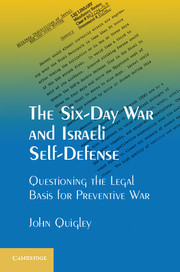Book contents
- Frontmatter
- Contents
- Preface
- Note on Official Documents
- Abbreviations
- The Six-Day War and Israeli Self-Defense
- Part One A War is Generated
- 1 Who Was to Blame and Why It Matters
- 2 The Syrian Connection
- 3 Egypt Flexes Its Muscle
- 4 Historical Opportunity for Israel
- Part Two Cold War Togetherness
- Part Three The First Victim of War
- Part Four Rallying Round Self-Defense
- Part Five War Without Limit?
- Part Six Peace Sidelined
- Notes
- Bibliography
- Index
1 - Who Was to Blame and Why It Matters
Published online by Cambridge University Press: 05 February 2013
- Frontmatter
- Contents
- Preface
- Note on Official Documents
- Abbreviations
- The Six-Day War and Israeli Self-Defense
- Part One A War is Generated
- 1 Who Was to Blame and Why It Matters
- 2 The Syrian Connection
- 3 Egypt Flexes Its Muscle
- 4 Historical Opportunity for Israel
- Part Two Cold War Togetherness
- Part Three The First Victim of War
- Part Four Rallying Round Self-Defense
- Part Five War Without Limit?
- Part Six Peace Sidelined
- Notes
- Bibliography
- Index
Summary
Responsibility for wars of the past may seem an inconsequential matter. But the consequences of wars need to be sorted out, and how a war started may be key to an appropriate resolution. Beyond the particular conflict, the manner in which one war is fought may set a precedent for future wars. A war may be rationalized in a way that stretches the legal basis for military action. The UN Charter indicates that when the UN Security Council takes military action, it should be by national forces seconded to the UN operating under UN command. But in 1950, leading member states wanted military action in support of South Korea but were unwilling to second troops to UN control. So the Security Council adopted a resolution in which it “recommended” to member states that they provide assistance to South Korea. No command structure or method of coordination was specified. That same technique of, in effect, farming the operation out to individual member states was used again in 1990 for military action against Iraq, following its occupation of Kuwait, and again in 2011 for military action in Libya. While one can agree or disagree with the Security Council's approach, the effect was to broaden the bases on which military action might be taken under UN auspices.
The June 1967 Middle East war was fought not under UN auspices but on the strength of the power of individual states to resort to war. Under the UN Charter, states may not initiate war against another. Force may, however, be used in defense in the event of an “armed attack.” Egypt, as we shall see, charged aggression, and self-defense was invoked by Israel. According to Israel, Egypt had attacked by land and by air on the morning of June 5, 1967, and Israel responded. Eventually, however, as we shall also see, the propriety of the war's initiation came to be contested on defending not against an actual attack, but against an anticipated attack. Israel would make the legal claim that force may be used in anticipation of an attack by the other state, and the factual claim that Egypt was about to attack it.
- Type
- Chapter
- Information
- The Six-Day War and Israeli Self-DefenseQuestioning the Legal Basis for Preventive War, pp. 3 - 5Publisher: Cambridge University PressPrint publication year: 2012



